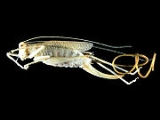
Spinochordodes tellinii
Overview
Nematomorpha
Nematomorpha is a phylum of parasitic animals that are superficially morphologically similar to nematode worms, hence the name. They range in size in most species from long and can reach in extreme cases up to 2 metres, and in diameter...
Spinochordodes tellinii is a parasitic
Parasitism
Parasitism is a type of symbiotic relationship between organisms of different species where one organism, the parasite, benefits at the expense of the other, the host. Traditionally parasite referred to organisms with lifestages that needed more than one host . These are now called macroparasites...
worm whose larva
Larva
A larva is a distinct juvenile form many animals undergo before metamorphosis into adults. Animals with indirect development such as insects, amphibians, or cnidarians typically have a larval phase of their life cycle...
e develop in orthoptera
Orthoptera
Orthoptera is an order of insects with paurometabolous or incomplete metamorphosis, including the grasshoppers, crickets and locusts.Many insects in this order produce sound by rubbing their wings against each other or their legs, the wings or legs containing rows of corrugated bumps...
n insect
Insect
Insects are a class of living creatures within the arthropods that have a chitinous exoskeleton, a three-part body , three pairs of jointed legs, compound eyes, and two antennae...
s (grasshoppers and crickets). This parasite is able to influence its host's behavior: once the parasite is grown, it causes its grasshopper host to jump into water, where the grasshopper will likely drown. The parasite then leaves its host; the adult worm lives and reproduces in water. S. tellinii does not influences its host to actively seek water over large distances, but only when it is already close to water.
The microscopic larvae are ingested by their insect hosts and develop inside them into worms that can be three to four times longer than the host.
The precise molecular mechanism underlying the modification of the host's behaviour is not yet known.

